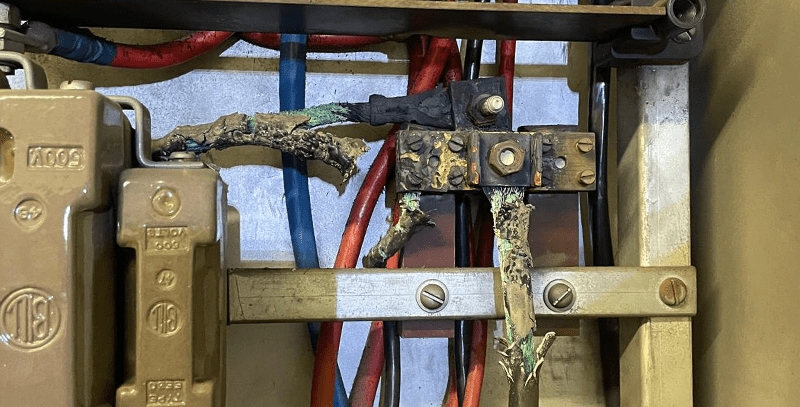Why London Businesses Need Commercial Electrical Upgrades Now
We’ve been helping London businesses for over 25 years, keeping their commercial electrical systems upgraded, updated and ready to meet the demands of modern work. In today’s fast-moving business world, having a dependable electrical system isn’t just a nice-to-have, it’s essential for keeping your business running smoothly and protecting your team.
According to the UK’s Electrical Safety Council, outdated wiring contributes to 1 in 5 commercial electrical incidents each year. The Approved Cables Initiative (ACI) cites UK government data showing that 18% of accidental electrical fires in England were attributed to wiring, cabling or plugs. Source
Many businesses, particularly those operating in older buildings, may not realise that their electrical systems are outdated and potentially hazardous. Upgrading these systems can lead to significant improvements in safety, efficiency, and overall productivity.
What are the warning signs that a commercial electrical system needs an upgrade? Flickering lights, tripping breakers, or power surges are your first clues. If your system’s over 15–20 years old or can’t keep up with your equipment, it’s time for a professional assessment.

The benefits of modernising your electrical infrastructure extend beyond mere compliance; they can transform the way your business operates, allowing for greater flexibility and innovation. Moreover, an upgraded electrical system can enhance the overall aesthetic and functionality of a workspace. Modern electrical solutions often incorporate smart technology, enabling businesses to manage energy consumption more effectively.
This not only contributes to a more sustainable operation but also creates a more comfortable environment for employees and clients alike. As businesses increasingly rely on technology, ensuring that the electrical system can support advanced equipment becomes paramount.
aramount.
Summary
- Upgrading your electrical system can bring shocking revelations about the benefits it can bring to your business.
- Aging electrics could be holding your business back and causing power problems at work.
- Outdated wiring can pose hidden risks to your business and its operations.
- Future-proofing your business with an upgraded electrical system can ensure compliance with electrical regulations and reduce the risk of electrical fires.
- Upgrading your electrical system can lead to potential cost savings in the long run, making it a worthwhile investment for your business.
Aging Electrics Holding Your Business Back?
Aging electrical systems can significantly hinder a business’s performance. Outdated wiring and insufficient power supply can lead to frequent disruptions, causing downtime that directly impacts productivity. For instance, a manufacturing facility with an inadequate electrical system may experience machinery malfunctions or slowdowns, resulting in lost revenue and delayed project timelines.
Furthermore, employees may find it challenging to work efficiently in an environment where power fluctuations are common, leading to frustration and decreased morale. In addition to operational inefficiencies, aging electrics can also limit a business’s ability to expand or adopt new technologies. As companies grow, their energy needs evolve, and an outdated system may not be able to accommodate additional equipment or increased power demands.
This limitation can stifle innovation and prevent businesses from staying competitive in their respective markets. By recognising the signs of an aging electrical system and taking proactive steps to upgrade, businesses can unlock their full potential and position themselves for future success.
Power Problems at Work?
We support businesses across Central London, East London, and surrounding areas and have noticed power problems in the workplace can manifest in the simpliest ways, from flickering lights to complete power outages, even minor fluctuations can affect sensitive equipment, slow down production, or cause data loss, creating frustration for employees and reducing overall productivity.
These issues not only disrupt daily operations but can also pose serious safety risks to employees. For example, a large UK food manufacturing facility experienced a fault on its high voltage (11 kV) network when oil‑filled switchgear failed, causing loss of supply. An ageing electrical system can force an emergency response, large spend, disruption and risk. Upgrading ahead of failure pays off.
Additionally, power surges can compromise sensitive electronic devices, resulting in costly repairs or replacements. Moreover, frequent power problems can create an atmosphere of uncertainty and stress among employees. When workers are concerned about the reliability of their power supply, it can detract from their focus and productivity.
In contrast, a well-functioning electrical system fosters a sense of security and stability, allowing employees to concentrate on their tasks without the distraction of potential power issues. By addressing power problems through an upgrade, businesses can create a more conducive work environment that promotes efficiency and employee satisfaction.
Outdated Wiring = Hidden Risks
| Location | Number of Outdated Wiring | Risk Level |
|---|---|---|
| Residential Buildings | 350 | High |
| Commercial Buildings | 120 | Medium |
| Industrial Facilities | 80 | High |

Electrical systems must meet current UK standards. Outdated wiring is often a silent threat lurking within many commercial properties. Over time, wiring can deteriorate due to wear and tear, leading to increased resistance and potential overheating. This deterioration not only poses a risk of electrical fires but can also result in costly damage to equipment and property.
How much could upgrading my business’s electrical system save in maintenance and downtime costs? A modern electrical setup reduces costly breakdowns and prevents downtime. Businesses often save thousands a year by avoiding production stops and repeated callouts.
For instance, frayed wires or loose connections can create sparks that ignite nearby materials, leading to catastrophic consequences. Furthermore, outdated wiring may not meet current safety standards or regulations, exposing businesses to legal liabilities. In the event of an incident caused by faulty wiring, companies could face significant financial repercussions, including fines and lawsuits.
Quick fact: Wiring defects account for a significant portion of electrical fires in the UK, particularly in older commercial buildings.
By upgrading to modern wiring systems that comply with current regulations, businesses can mitigate these risks and ensure the safety of their employees and assets. Investing in new wiring is not merely a matter of compliance; it is a crucial step towards safeguarding the future of the business.
Future-Proofing Your Business
Future-proofing is an essential consideration for any business looking to thrive in an ever-evolving landscape. Upgrading your electrical system is a proactive measure that prepares your organisation for technological advancements and changing energy demands. As industries increasingly adopt automation and smart technologies, having an electrical infrastructure that can support these innovations is vital for maintaining competitiveness.
Will upgrading my electrical system help support business growth and new technology?
Yes — newer systems handle higher loads, modern machinery, and smart tech safely. An upgrade future-proofs your premises for expansion and energy-efficient equipment.
Additionally, future-proofing through electrical upgrades can lead to enhanced energy efficiency. Modern systems often incorporate energy-saving technologies such as LED lighting and smart meters that allow for better monitoring of energy consumption. This not only reduces operational costs but also aligns with growing environmental concerns and corporate sustainability goals.
By investing in a future-ready electrical system today, businesses position themselves for long-term success while contributing positively to the environment.
If you recognise any of these signs or want peace of mind, get in touch for a comprehensive electrical health check.
Do you need a electrical assessment?
Compliance with Electrical Regulations
Compliance with electrical regulations is not just a legal obligation; it is a fundamental aspect of running a safe and responsible business. Electrical standards are designed to protect both employees and customers from potential hazards associated with faulty wiring or outdated systems. Failure to comply with these regulations can result in severe penalties, including fines or even closure of the business until necessary improvements are made.
Upgrading your electrical system ensures adherence to current regulations while also demonstrating a commitment to safety and quality. This proactive approach not only protects the business from legal repercussions but also enhances its reputation among clients and stakeholders. A company known for prioritising safety is more likely to attract customers who value responsible practices, ultimately contributing to its growth and success.
Reduced Risk of Electrical Fires
One of the most pressing concerns associated with outdated electrical systems is the heightened risk of electrical fires. According to statistics from fire safety organisations, faulty wiring is one of the leading causes of commercial fires. These incidents can result in devastating losses, including property damage, injury, or even loss of life.
By upgrading your electrical system, you significantly reduce the likelihood of such tragedies occurring. Modern electrical systems are designed with advanced safety features that minimise fire risks. For example, circuit breakers and surge protectors help prevent overloads that could lead to overheating and fires.
Additionally, regular inspections and maintenance of upgraded systems ensure that any potential issues are identified and addressed promptly. By prioritising fire safety through electrical upgrades, businesses not only protect their assets but also safeguard the well-being of their employees and customers.
Potential Cost Savings in the Long Run
While the initial investment in upgrading an electrical system may seem daunting, the long-term cost savings often outweigh these upfront expenses. Modern systems are typically more energy-efficient, leading to reduced utility bills over time. For instance, switching to LED lighting can result in significant savings on electricity costs while also requiring less frequent replacements compared to traditional bulbs.
Moreover, by minimising the risk of electrical failures or fires through an upgraded system, businesses can avoid costly repairs and insurance claims associated with such incidents. The peace of mind that comes from knowing your electrical infrastructure is reliable allows companies to focus on growth rather than worrying about potential disruptions. In essence, investing in an upgraded electrical system is not merely an expense; it is a strategic decision that can yield substantial financial benefits over time while enhancing overall operational efficiency.
What is the process for upgrading a commercial electrical system and what should business owners expect? It starts with a site assessment and detailed report. Then, upgrades are scheduled around your business hours to minimise disruption, usually completed in planned stages for safety and efficiency.
